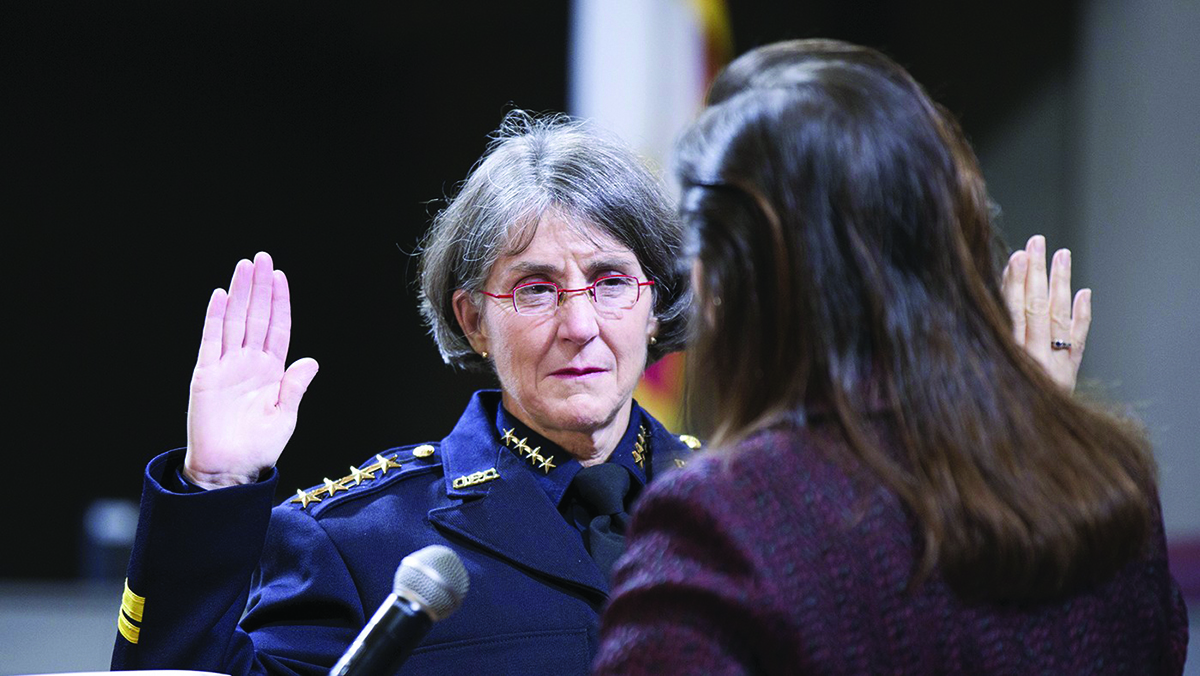News
Proposed City Council Rule Change Falls Short in Face of Community Opposition

Speakers concerned about Chief Kirkpatrick’s interference in council decisions; Her
actions also cost her former employer, City of Spokane, $1.7 million jury award
Conflicts about abuse of power and political intrigue that are typically a feature of debates at the national level arose at the Oakland City Council meeting this week. Dozens of people from the community showed up to oppose a resolution to give the council president unchecked authority to appoint and remove committee chairs and members.
Speaker after speaker blasted the resolution as an anti-democratic move designed to intimidate oppositional, progressive voices on the council. A number of speakers said the change was especially meant to silence Public Safety Committee Chair Desley Brooks, who has been outspoken in condemnation of the Oakland Police Department’s cooperation with ICE immigration raids in violation of the sanctuary city policy passed by the council.
In the course of the debate, Council President Larry Reid admitted he had been called by Police Chief Anne Kirkpatrick about this issue but refused to discuss the content of their conversation.
Until now, the council’s Rules and Procedures has granted the president the authority to appoint committee members and chairs for two-year terms and has required that the appointments go to a council vote for confirmation.
The rule change, proposed by Councilmembers Lynette Gibson McElhaney and Annie Campbell Washington and Council President Larry Reid, would have allowed the president to shuffle committee chairs and members at any time and would remove the requirement for a council confirmation vote.
Not a single speaker who addressed the council supported the motion. In the face of community opposition, the proposal failed, winning only four votes, one vote short of what it needed to pass. It was supported by the proposal’s original three sponsors and Councilmember Abel Guillén.
Ultimately, a modified motion was passed, proposed by Councilmember Dan Kalb.
Falling short of what the McElhaney proposal was trying to achieve, the new rule—which goes into effect immediately—gives the council president power to appoint and remove committee members at will, but requires that his decisions go to the council for ratification.
Under the new rule, changes in committee membership cannot go into effect without public debate and a council decision.
Voting for the rule change were McElhaney, Campbell Washington, Reid, Guillén and Kalb. Opposed were Brooks and Noel Gallo. Councilmember-at-Large Rebecca Kaplan abstained.
Concerns have been circulating about whether Police Chief Anne Kirkpatrick had contacted Council President Reid about removing Brooks from her position as chair of Public Safety, and when questioned at the meeting by a community member, Reid said he had received a call from the chief.
Jonah Strauss of the Oakland Warehouse Coalition asked President Reid, “Did you have a recent call with Anne Kirkpatrick, chief of police? Do you feel it is appropriate for OPD to have a say in committee assignments?”
Reid responded, “Yeah, the police chief called me, but that’s my conversation with her, and I don’t have to share it with you. That’s my answer to your question.”
Rashidah Grinage of the Coalition for Police Accountability criticized the chief for interfering in city government and councilmembers for doing her bidding.
The police chief is afraid of an elected councilmember “to the point where she crosses all kinds of ethical and governmental

Rashidah Grinage
processes to make an effort to remove this person who has oversight,” said Grinage.
The chief is “so intimidated by being questioned and asked to account for her own actions that she retaliates against this person who is doing her job [and] who is representing the interests and the values and the laws of the community,” she said.
“This is a very frightening situation if this council is going to knuckle to pressure from a police chief,” she said. “Think about the signal that will send to this community.”
“You seem to think we don’t know what’s behind [the rule change], and in your efforts to be obscure, you are very clear and transparent,” Grinage said.
The East Bay Times reported Wednesday that the police chief said she had called Reid “to express concerns” about the December verdict in Elaine Brown’s lawsuit against the city and Brooks.
The police chief was herself the subject of a lawsuit while she served in Spokane, costing the city nearly $2 million.
Councilmember McElhaney said the rule change was only to make the council rules more efficient and modern, in line with how other cities assign committee members.
“Since 2014, I have sought to bring forth these changes…to provide for a continuity of service in case there is an interruption in our chair leadership [for health or other reasons],” said McElhaney.
“I have sought to bring modernization to [the rules],” she said.
Campbell Washington said, “This a very common rule in legislative bodies. I believe it will allow us to manage our business in a way that is necessary and respond to issues that we need to respond to.”
Kaplan questioned the motivation and consequences of the rule change.
“I don’t see any reference [in the proposal] to when a committee chair is incapacitated,” she said.
“But it appears this would allow committee assignments to be changed daily, hourly, for any reason, for no reason, and in fact there be no protections at all [against] it being used to punish somebody for not voting for something or for other reasons that would really be disruptive to the integrity of the body.”

Desley Brooks
Councilmember Brooks called the proposal part of a “concerted effort” on the part of councilmembers, the administration and the media “to try and seize this moment, to try to get the public to make a rush to judgment about me.”
“[This] really isn’t just about me,” she said. “I am just the vehicle. This has been an attempt to silence the voice of the community.”
A number of speakers syosupported Brooks’ work as a defender of the interests of the community.
Anthony Palik said he has been living in Oakland for less than a week and came to the council meeting after reading newspapers.
“[Desley Brooks] is obviously someone who can speak truth to power, and she’s a courageous woman for doing so,” he said.
“To hear what Ms. Brooks had to say convinced me that there’s a problem here. And that problem is the consolidation of power…an attempt of the majority to silence the minority.”
Turha Ak of the Community Ready Corps talked about how Brooks helped protect people during the protests in 2009 when Oscar Grant was killed by BART police.
He explained that as he was “trying to get people out to safety,” Ms. Brooks stepped through the tear gas, made [the police] back down and allowed me to get the people out.”
“You are not going to tell me that this isn’t about getting rid of her,” he said. “We’re (not) going to play that game,” he said. “You do developers’ business. You do corporations’ business. You do your business. You don’t do the people’s business.”
Cat Brooks, a journalist, actor and leader of the Anti Police-Terror Project, said, “This is not about personal relations. It’s about when the people say this is how we want to move, and we got hundreds of people inside this room saying this is how Oakland wants you to move, Desley listens when we say that.
“We have to be clear that getting Desley off of this council is getting progressive voices out of the room.”
In November 2011, a jury found that then-Spokane, WA Police Chief Anne Kirkpatrick (left) had illegally fired a police officer and then retaliated against him even after the officer was cleared of any wrongdoing. The jury ultimately awarded the officer $1.7 million.
Activism
Oakland Post: Week of April 24 – 30, 2024
The printed Weekly Edition of the Oakland Post: Week of April 24 – 30, 2024

To enlarge your view of this issue, use the slider, magnifying glass icon or full page icon in the lower right corner of the browser window. ![]()
Activism
Oakland Post: Week of April 17 – 23, 2024
The printed Weekly Edition of the Oakland Post: Week of April 17 – 23, 2024

To enlarge your view of this issue, use the slider, magnifying glass icon or full page icon in the lower right corner of the browser window. ![]()
California Black Media
Yahushua’s Law: Senate Advances Bill to Protect Students from Extreme Weather
In a significant move towards student safety, the California Senate Education Committee passed Senate Bill (SB) 1248, also known as Yahushua’s Law, on April 3. The bill is named in memory of Yahushua Robinson, a 12-year-old student from Lake Elsinore, who tragically died due to a heat-related illness during a physical education class in 2023. It is a pioneering effort to prevent similar incidents in the future.

By California Black Media
In a significant move towards student safety, the California Senate Education Committee passed Senate Bill (SB) 1248, also known as Yahushua’s Law, on April 3.
The bill is named in memory of Yahushua Robinson, a 12-year-old student from Lake Elsinore, who tragically died due to a heat-related illness during a physical education class in 2023. It is a pioneering effort to prevent similar incidents in the future.
Authored by Senator Melissa Hurtado (D-Bakersfield) and co-authored by Assemblymember Akilah Weber, M.D. (D-La Mesa), SB 1248 directs the California Department of Education to develop comprehensive guidelines for schools regarding student activity during all extreme weather conditions.
“No student should ever lose their life on campus to extreme weather when we can take steps to protect them by preparing statewide plans to minimize exposure to the most harmful elements of exposure,” Hurtado said after introducing SB 1248.
The bill stipulates that schools must implement safety measures which include monitoring weather forecasts, postponing or relocating outdoor activities during hazardous conditions, and ensuring students have proper hydration and access to shade. It also requires schools to establish clear communication plans to keep parents, teachers, and students informed about potential weather hazards.
Supporters of the bill include the Robinson family, advocate Christina Laster, Bold Enterprises LLC, California Black Women’s Collective Empowerment Institute, Familias Empoderadas del Valle Central National Action Network, The Black Student Advocate, and the Ventura County Alumnae Chapter of Delta Sigma Theta Sorority.
Thanking Hurtado for introducing this crucial legislation, Weber said, “The story of Yahushua Robinson last year was heartbreaking. We have protections for farm workers and other industries in the case of extreme weather, now climate change is forcing us to also extend similar protections to students at school.”
-

 Activism4 weeks ago
Activism4 weeks agoOakland Post: Week of March 27 – April 2, 2024
-

 #NNPA BlackPress4 weeks ago
#NNPA BlackPress4 weeks agoCOMMENTARY: D.C. Crime Bill Fails to Address Root Causes of Violence and Incarceration
-

 #NNPA BlackPress4 weeks ago
#NNPA BlackPress4 weeks agoMayor, City Council President React to May 31 Closing of Birmingham-Southern College
-

 #NNPA BlackPress4 weeks ago
#NNPA BlackPress4 weeks agoBeloved Actor and Activist Louis Cameron Gossett Jr. Dies at 87
-

 Community1 week ago
Community1 week agoFinancial Assistance Bill for Descendants of Enslaved Persons to Help Them Purchase, Own, or Maintain a Home
-

 Activism3 weeks ago
Activism3 weeks agoOakland Post: Week of April 3 – 6, 2024
-

 Business1 week ago
Business1 week agoV.P. Kamala Harris: Americans With Criminal Records Will Soon Be Eligible for SBA Loans
-

 Activism2 weeks ago
Activism2 weeks agoOakland Post: Week of April 10 – 16, 2024






















































